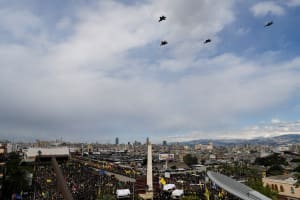Israel’s West Bank ‘occupation’ hearing begins at International Court of Justice on Monday
UN General Assembly asked for non-binding court opinion in 2022

The United Nations’ International Court of Justice (ICJ) in The Hague on Monday will begin a week of hearings regarding the UN General Assembly’s 2022 request for an opinion on the “legal significance of the ongoing Israeli occupation” in the West Bank.
The hearings for an advisory, non-binding opinion will be opened by Palestinian Foreign Minister Riyad al-Maliki.
The Palestinian Authority was behind the original push at the General Assembly (UNGA) to petition the court and seek a ruling stating that Israel is illegally controlling the West Bank, also known as Judea and Samaria, as well as the eastern part of its capital Jerusalem.
According to reports, the ICJ will probe Israel’s “occupation, settlement and annexation ... including measures aimed at altering the demographic composition, character, and status of the Holy City of Jerusalem, and from its adoption of related discriminatory legislation and measures.”
“The Jewish people are not occupying its land and is not occupying its eternal capital, Jerusalem. No UN resolution can distort this historical truth,” Israeli Prime Minister Benjamin Netanyahu responded.
Israel doesn’t accept the World Court’s jurisdiction over the issue and has not sent a delegation to provide counterarguments. Instead, it has reportedly filed 'written observations' and the judges are expected to deliberate for several months before announcing a decision.
On Monday, the Israeli Government Press Office (GPO) issued the following statement regarding the hearing: "Israel does not recognize the legitimacy of the proceedings of the international court in The Hague regarding 'the legality of the occupation' – which are an effort designed to infringe on Israel's right to defend itself against existential threats."
"The proceedings in The Hague are part of the Palestinian attempt to dictate the results of the diplomatic settlement without negotiations. We will continue to reject this; the Government and the Knesset are united in rejecting this unacceptable course of action"
In 2004, UNGA had already appealed to the ICJ for an opinion on the same issue, with the court ruling that Israel’s separation barrier along the border with the West Bank violated international law.
Despite the court’s ruling that the barrier should be taken down, Israel continues to maintain it and points to the marked decrease in terror attacks from the West Bank since its construction.
In 2022, the United Nations voted 98-17 in favor of the motion brought forward by Nicaragua at the request of the Palestinian Authority (PA).
While the United States, Canada, Australia, Italy and Germany voted against the resolution; Russia and Ukraine, as well as Israel’s Abraham Accords partners – the United Arab Emirates, Bahrain and Morocco – voted in favor.
Israel took control of Judea and Samaria from the Jordanians during the Six-Day War in 1967 but has never applied sovereignty to the territory, unlike East Jerusalem and the Golan Heights, which were declared Israeli territory.
According to the Yesha Council, more than 460,000 Jews are currently living in several towns and settlements across Judea and Samaria.
The rulings of the ICJ are binding. However, the court – a separate body from the International Criminal Court in the Hague – has no power to enforce them.

The All Israel News Staff is a team of journalists in Israel.













